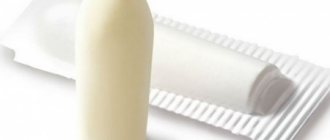Childbirth inevitably affects the state of any woman’s body, and it takes time to recover. Changes affect the reproductive system. It is simply impossible to name the only correct time when menstruation begins after childbirth while breastfeeding. Normalization of the cycle depends on a number of factors.
No less important is the question of whether menstruation can begin if the baby is fed breast milk. Often, menstruation appears before the end of the lactation period. Often the cycle begins to recover at the moment when the first complementary foods are introduced.
When does menstruation come after childbirth during breastfeeding?
The timing of normalization of reproductive function depends primarily on the level of hormones in the body. Many women, when breastfeeding, note that menstruation does not come until a year later. Other factors also affect reproductive function. For non-breastfeeding mothers, it takes about 50 days to restore the cycle. If you are breastfeeding, you may get your period in just 100 days. In the same case, when the baby receives mixed nutrition, the cycle returns to normal after 3-4 months.
If your baby only receives breast milk
Menstruation may not begin for a long period during lactation. Due to frequent breastfeeding, intensive production of prolactin occurs, which promotes the appearance of milk. Its high concentration creates an obstacle to the normal activity of the ovaries and the normalization of the cycle. Despite this, in some cases, with natural feeding, critical days are observed several months after the birth of the child. Such changes are caused by certain characteristics of the body.
When breastfeeding for a long period (1.5 years) at night and during the day, regulation may not begin until two years. At the same time, you should not perceive the absence of menstruation as the development of a problem in the body.
As soon as natural feeding stops, the menstrual cycle will begin to restore, and your period will soon begin.
Some people use lactational amenorrhea as a means of contraception, but doctors note that this is not the most reliable method of protection.
If feeding is mixed
Mixed feeding and menstruation is one of the normal options. If you feed your baby not only with breast milk, but also with special formulas, then the hormone prolactin ceases to be produced so actively, and accordingly, the restoration of reproductive function begins, as a result of which menstruation appears.
Often the introduction of complementary foods is due to a lack of breast milk. The problem is caused by prolactin deficiency. If there is not enough of this hormone in the body, then the ovaries begin to function - and menstruation appears during lactation. When breastfeeding and introducing additional food into the baby's diet, bleeding will begin after 2-3 months.
Even when a woman does not feed the baby, but only gives the newborn some water after feeding, menstruation often appears during breastfeeding. Reproductive function is restored even in the absence of night feedings.
Naturally, after the cessation of lactation, the concentration of prolactin decreases sharply and the reproductive system gradually begins to function. Although in the first months the nature of these discharges and the duration of critical days may change.
The effect of menstruation on breast milk and baby feeding
Lactation and menstruation are compatible concepts, but many mothers worry that the appearance of discharge will negatively affect the feeding of the child. It is important to understand that when the cycle resumes, the amount of milk will decrease slightly, and the baby may behave restlessly and linger longer at the breast. Such changes are associated with hormonal fluctuations. They do not pose any danger to natural feeding - after 2-3 days the situation returns to normal.
Most often, nursing mothers are concerned about the question of whether menstruation affects the taste and quality of milk. There is no need to worry about this, since there is no scientifically proven data on such a connection.
Experts say that it is not only possible, but also necessary to continue breastfeeding when menstruation resumes - this combination does not create any contraindications.
Reviews from women about the effect of menstruation on the composition of breast milk and its production
Both my daughters and I got our periods 2 months after giving birth. From the first, there was no less milk. With the second, I notice that a day or two before the start and during menstruation, yes, less. But then it returns to normal again. About the taste - try it yourself, as for me, the taste does not change one iota. It becomes bitter when you stop feeding it - then it, as they say, “burns out.”
Anna
https://www.komarovskiy.net/forum/viewtopic.php?t=13269&start=15
My period came too. This didn’t affect me in any way and my daughter sucked like she sucked))) So I calmed down and I think that there’s nothing scary here anymore)))
Lidusik
https://deti.mail.ru/forum/nashi_deti/kormim_grudju/mesjachnye_pri_kormlenii_grudju_chto_delat/
For me, too, it started to disappear around 3–4 months. It was already half a year, and my first period came only three months later - so everything is individual. And to maintain lactation there is Lactagon, I haven’t tried it myself, but they say it helps, and in the first months I had tea with milk (very warm, almost hot). In general, periods and milk are not connected in any way. My friend fed her child until she was one and a half years old (!!!) and there was a lot of milk, she even expressed it because... a child at this age no longer needs so much - there is other food, but her period came much earlier! Also about half a year.
Lion cub R-r-r-meow!
https://forum.mytischi.ru/index.php?/topic/50694
What should your period be like after childbirth?
The first menstruation after childbirth differs from those before pregnancy. This is due to the expansion of the cervical canal and changes in the mother’s condition associated with the birth of the baby. During this period, there is often a delay in menstruation.
Hormonal imbalance leads to irregular periods. The regularity of menstruation will be restored only after 90–120 days. That is why women often complain that the regulation was there and disappeared again. At this point, the menstrual cycle has not yet normalized, and such disruptions are considered normal.
Irregular periods are observed during breastfeeding. Only after the end of the lactation period will a full restoration of the cycle occur, and menstruation will occur on time.
If your period comes while breastfeeding, you should not stop breastfeeding. The cycle will be restored regardless of whether lactation continues or not.
It is often noted that previously painful menstruation becomes asymptomatic. Such changes are due to the fact that the pain syndrome was caused by the bending of the uterus, due to which the outflow of blood is problematic. After the birth of a child, this bend no longer exists.
Menstruation during breastfeeding is often scanty or excessively abundant. After breastfeeding is stopped, the volume of blood lost returns to normal.
Features of menstruation during breastfeeding: nature, symptoms, regularity
During the restoration of the cycle during breastfeeding, the nature of menstruation may differ from what is usual for a woman, and may not bring any surprises at all. Let's consider the main parameters of menstruation after childbirth:
- quantity. Usually the first menstruation is scanty (volume up to 80 ml) and does not last long, but over the course of several cycles the picture approaches what it was before pregnancy. An exception may be particularly heavy discharge - after childbirth, the volume often decreases, and this becomes the new norm for a woman;
- consistency and color of discharge. They usually have no special features during breastfeeding. The first day - spotting bloody mass, subsequent days - blood with possible inclusions of clots;
- the smell of menstrual blood. It should not be unpleasant, putrid and pronounced.
The symptoms of the first and subsequent periods after childbirth remain typical - nagging discomfort in the lower abdomen and some general weakness are acceptable. Itching, fever, severe pain, large volumes of discharge should be a reason to consult a doctor. The cycle is restored gradually, and normally its duration should reach the accepted values - from 21 to 34 days.
Painful sensations during menstruation can greatly overshadow the condition of a nursing mother, so the use of medications is allowed to relieve them
If the pain causes significant discomfort, it must be relieved, since the stress associated with pain is a direct threat to breastfeeding. With the doctor's permission, it is allowed to take painkillers, for example, Ibuprofen (Nurofen), No-Shpa (Drotaverine), Paracetamol (Panadol, Efferalgan).
Is it possible to breastfeed during menstruation?
Women often think about whether the taste of milk changes with the onset of menstruation, and believe that menstrual periods are a good reason to stop breastfeeding. Doctors claim that restoration of the reproductive system does not affect milk. This product contains a huge amount of useful substances necessary for the normal development of the baby, and therefore it is recommended to continue breastfeeding during menstruation.
It is sometimes noted that during critical days, lactation decreases. To avoid loss of milk volume, you just need to reduce the intervals between feedings.
During menstruation, sweating increases significantly. Most of the glands are located in the nipple area. Milk acquires a specific taste that the baby may not like. Avoiding such problems while breastfeeding is quite simple. You just need to wash the mammary glands more often and maintain personal hygiene.
When do they start
Menstruation means you can get pregnant again. A young mother’s body recovers over several months, so menstruation during breastfeeding is a normal reaction. But everything has its own deadline, so it appears differently for everyone.
In 37% of women, the body can induce menstruation within up to six months. But when do the remaining 63% get their periods? Modern girls cannot stay near the child for too long, so they use various breast “substitutes”: nipples, bottles. This need is dictated by modern realities. Menstruation during lactation then occurs at the 3rd month and there is nothing wrong with that. When “those days” begin during breastfeeding, it is useful to remember the experience of one scientist.
The Dutch scientist Otto Schaffer studied the cycle in Canadian Eskimo women in the eighties of the 20th century. Living far from civilization, these ladies could again think about a new child only after 20-30 months, and before that they were constantly with their firstborn. By this time, the child can already eat other foods.
9-20 months is the general period for the resumption of the menstrual cycle in girls (~71%).
14 months is the average time for a woman to resume her cycle.
The conclusion from this work is clear: the sooner you stop breastfeeding, the sooner menstrual cycles will appear in the nursing mother. The frequency of feeding a baby does not affect the appearance of menstruation.
How long will it take for your period to come if you don't breastfeed at all?
Menstruation after birth with artificial feeding appears only 50 days after the birth of the baby. Minor deviations, both upward and downward, are also allowed. The time frame for regulation to be restored after childbirth depends on the state of health, hormonal levels and exposure to external factors. Stress, unfavorable climate, lifestyle and diet - all this affects when a woman begins to menstruate.
When to see a doctor
Some phenomena can cause concern for a nursing mother who has had her period. The cycle that begins may at first be irregular and differ from normal menstruation in duration. It all depends on the hormonal background of the female body during menstruation. If bleeding does not stop for more than a week, then you need to see a gynecologist, as inflammation of the endometrium of the uterus is possible.
During lactation, bleeding may occur at intervals of several months, and this is considered normal. But if the cycle resumes a week after labor bleeding, then a doctor’s examination is needed, since polyps, cysts, or inflammation of the ovaries may appear after childbirth.
Bleeding during lactation may resume after cesarean section. Regardless of whether a woman gave birth vaginally or had a cesarean section, the amount of prolactin remains elevated. This means that she should not have menstruation while breastfeeding after surgery. But if the cycle resumes during lactation, then the reason for this will be the same factors as in women after natural childbirth.
It is also possible that there will be a long absence of menstrual bleeding after breastfeeding ends. On medical forums there was also a letter addressed to the doctor, in which the mother wrote: I have not fed the child for a month now, and the cycle has not resumed.
Regardless of how long lactation lasted, after stopping breastfeeding, the menstrual cycle should resume within 3 months. If this does not happen, then you need to contact a gynecologist to understand the problem.
Lochia – is it menstruation or not?
Many mothers in labor believe that they get their period immediately after the birth of the baby. Postpartum discharge has nothing to do with menstruation. The cycle simply does not recover in such a short period of time.
The blood that flows during this period is due to the healing process of the uterus after the placenta has been rejected. In medicine, such discharge is called lochia. Their average duration is from five to seven weeks. It was noted that the uterus recovers faster during breastfeeding. Only some time after the end of lochia does the period come.
What happens in a woman's body after childbirth
After undergoing a normal birth or cesarean section, the mother's body undergoes serious changes. During this period, there is a reverse development of all systems and organs that were changed in connection with pregnancy and the birth of a child. The duration of the body's restructuring is from six to eight weeks.
State of the nervous system and hormonal status
After the birth of a baby, serious hormonal changes occur in a woman’s body. Levels of progesterone and estrogen decrease significantly. For this reason, there is a decrease in the intensity of metabolism and the process of fat oxidation, due to which the amount of adipose tissue increases.
There is also active production of prolactin, a hormone that provokes the formation of milk in the breast. Due to its high concentration, periods disappear during breastfeeding. This is one of the amazing features of the female body.
Strong psycho-emotional stress leads to a weak reaction of the body to various stimuli. A depressive state is often observed.










